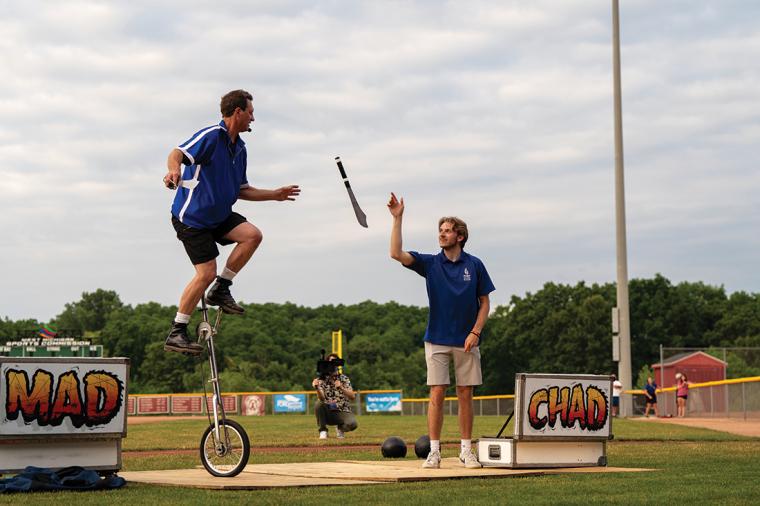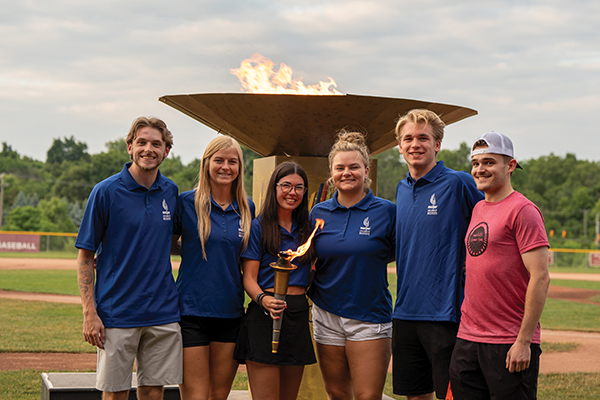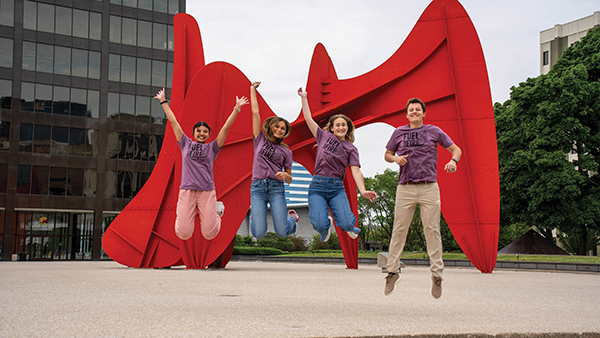
Interns can be a vital staffing solution to your organization while also delivering strong value to the candidates in your program. The West Michigan Sports Commission (WMSC) has had a successful internship program since its organization was conceived in 2007, playing an integral part of WMSC’s staffing and event management solutions. But having a strong internship program doesn’t happen by accident – it needs to be a purposeful part of your organization from the beginning.
Below are five steps to creating an internship program that adds value for all involved.
Create a Strong Pipeline
A successful internship starts with finding the right candidates – and that means developing a strong recruiting process and pipeline. Write a specific job description detailing the responsibilities of the job and hours required. Recruit in the same cycle as your area universities. At the WMSC, we recruit for the winter, spring and summer semesters so that students rotate on and off as their semesters start and end.
To raise awareness of our internship program, we talk to college classes annually, especially at our neighboring Grand Valley State University which has a major in Sports Management. It’s not only a great way to recruit interns, but it also raises awareness among students about our organization and the role of a sports commission. Our staff also speak to GVSU’s Introduction to Sports Management class consisting of mostly sophomores to let them know about our organization and events so they remember us and apply to be interns in the future.
We also use the Handshake online career platform to promote our internships and locate interested students, drawing candidates from beyond Grand Rapids to universities around the state that we might otherwise miss. We also give specific instructions in the application – if a student doesn’t follow them, it can impact how far they get in the interview process, since details matter on the job. Beyond skillset, also look at their personality and preferred work style. You want to hire someone who fits your company’s culture, works well in a team environment, etc.
Set Expectations Up Front

It’s important to set expectations up front about the internship position to ensure that this is a match for both parties. For example, while many intern responsibilities include working on events that are fun and exciting, we also have non-glamorous tasks that involve time in the office doing behind-the-scenes work.
Regarding work hours and dates, it is important to lay out the parameters up front. Because most of our interns staff events, they are expected to work weekends, including in the summer. In fact, we give candidates the dates of our main events during the application process, especially for internships that directly support events like the State Games of Michigan, a signature event of the West Michigan Sports Commission, and we explain up front that attendance at these events is a requirement of the job. That way, there are no surprises.
Let your interns know what type of work environment they can expect. We ask if they’re okay working in an open office environment like ours. There is a lot going on around them that they’re not involved in, so making sure they’re able to do what they need to and not get distracted is important.
Finally, pay your interns and let them know the expected and type of compensation – whether hourly, a monthly stipend, etc. If it needs to count for college credit, talk about the requirements of the university, necessary reporting and other requirements of the university, as well as if the student will be paid in addition to receiving college credits (which we recommend).
Offer Real-World Experiences

People often overlook the true value of interns, thinking of them as someone to pass down menial work. With smaller organizations like ours, we lean on interns just like our full-time employees who work right alongside us. They staff our events, and they even attend our planning meetings so they can learn the behind-the-scenes of the industry.
In the case of our State Games of Michigan, we only have two full-time staff dedicated to the program, supplementing the team with interns. We couldn’t run this event without them. They do everything from backend planning and organizing, to planning logistics for the opening ceremony, to running the entire event.
We have given interns some exciting opportunities over the years such as witnessing the entire NCAA March Madness bid process last year, including attending the site visits with Western Michigan University to help finish the bid for the NCAA. Also, it is essential to ask your interns what they’re interested in and what they’re good at so that you can steer them toward activities they like to do (e.g., event operations, marketing).
If interns get interesting, real-world experiences and are treated with a higher level of responsibility, they in turn feel more important, which ensures that they work harder and stay in the internship. And they often tell their college friends about the unique experience they had, which helps with future recruitment.
Be Flexible
Student interns, by their nature, require flexibility. We typically recruit college juniors and seniors (and sometimes sophomores) whose first job is to be a student and attend class. We make sure their education comes first, and we work with them to schedule their internship hours around their classes. That might mean they come in four days a week for five hours each, or maybe for three full days.
You might also consider doing “mini” internships to staff up for large events, which has worked well for our organization. For example, we have a one-week event this summer and next, and we recruited a college track athlete to be onsite the days of the track events. Essentially, we’re creating an experience-based volunteer program. It’s an ideal staffing solution as opposed to hiring a full-time, temporary employee. And the student benefits because he or she can put that experience on a resume.
Keep an Open Dialogue
With interns, a key part of retention and satisfaction is making sure there are open lines of communication. That includes creating a specific job description, followed by a thorough onboarding experience. We onboard our interns together, especially if we’re hiring them all at once to work on an event. This also helps build camaraderie.
Next, make sure they know clearly who they report to and ensure their supervisor is accessible and approachable, also making time to teach interns. It helps to have regular check-in meetings to ensure interns are doing okay, including inviting them to attend staff meetings. At the end of the internship, do an exit interview with them just like you would an employee.
We always do an end-of-internship lunch where we take the interns out their last week on the job and ask what they learned, how it went overall and get feedback for improvement. And keep in touch with your past interns after they graduate from college; they are prime candidates for full-time employees. (I can vouch for the return rate of interns becoming staff; at the West Michigan Sports Commission, almost half of our 10 full-time staff started as interns, including me!)
Interns can be a valuable part of your organization’s staffing solution while also fostering the next generation of employees in the sports tourism industry, benefiting all involved. SDM

